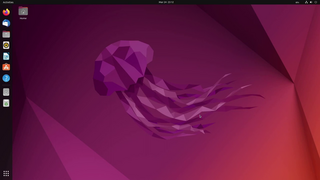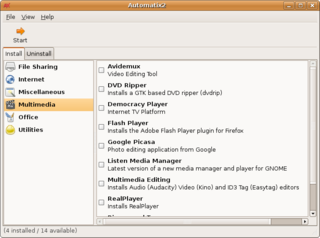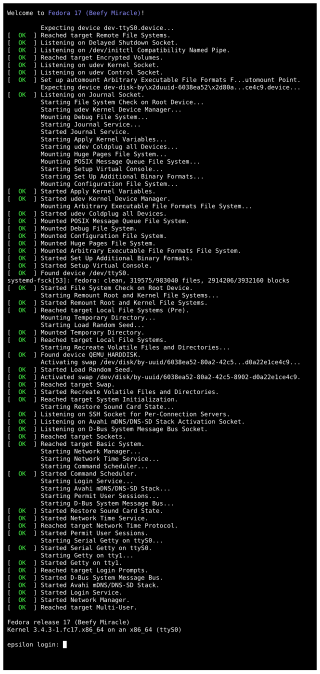
Debian, also known as Debian GNU/Linux, is a Linux distribution composed of free and open-source software and optionally non-free firmware or software developed by the community-supported Debian Project, which was established by Ian Murdock on August 16, 1993. The first version of Debian (0.01) was released on September 15, 1993, and its first stable version (1.1) was released on June 17, 1996. The Debian Stable branch is the most popular edition for personal computers and servers. Debian is also the basis for many other distributions that have different purposes, like Proxmox for servers, Ubuntu or Linux Mint for desktops, Kali for penetration testing, and Pardus and Astra for government use.

A Linux distribution is an operating system made from a software collection that includes the Linux kernel and often a package management system. They are often obtained from the website of each distribution, which are available for a wide variety of systems ranging from embedded devices and personal computers to servers and powerful supercomputers.

Mark Richard Shuttleworth is a South African and British entrepreneur who is the founder and CEO of Canonical, the company behind the development of the Linux-based Ubuntu operating system. In 2002, Shuttleworth became the first South African to travel to space, doing so as a space tourist. He lives on the Isle of Man and holds dual citizenship from South Africa and the United Kingdom. According to the Sunday Times Rich List in 2020, Shuttleworth is worth an estimated £500 million.

Ubuntu is a Linux distribution derived from Debian and composed mostly of free and open-source software. Ubuntu is officially released in multiple editions: Desktop, Server, and Core for Internet of things devices and robots. The operating system is developed by the British company Canonical and a community of other developers, under a meritocratic governance model. As of April 2024, the most-recent long-term support release is 24.04.

Canonical Ltd. is a privately held computer software company based in London, England. It was founded and funded by South African entrepreneur Mark Shuttleworth to market commercial support and related services for Ubuntu and related projects. Canonical employs staff in more than 70 countries and maintains offices in London, Austin, Boston, Shanghai, Beijing, Taipei, Tokyo and the Isle of Man.

Kubuntu is an official flavor of the Ubuntu operating system that uses the KDE Plasma Desktop instead of the GNOME desktop environment. As part of the Ubuntu project, Kubuntu uses the same underlying systems. Kubuntu shares the same repositories as Ubuntu and is released regularly on the same schedule as Ubuntu.

Launchpad is a web application and website that allows users to develop and maintain software, particularly open-source software. It is developed and maintained by Canonical Ltd.

Benjamin Mako Hill is a free software activist, hacker, author, and professor. He is a contributor and free software developer as part of the Debian and Ubuntu projects as well as the co-author of three technical manuals on the subject, Debian GNU/Linux 3.1 Bible, The Official Ubuntu Server Book, and The Official Ubuntu Book.

Compiz is a compositing window manager for the X Window System, using 3D graphics hardware to create fast compositing desktop effects for window management. Effects, such as a minimization animation or a cube workspace, are implemented as loadable plugins. Because it conforms to the ICCCM conventions, Compiz can be used as a substitute for the default Mutter or Metacity, when using GNOME Panel, or KWin in KDE Plasma Workspaces. Internally Compiz uses the OpenGL library as the interface to the graphics hardware.

PulseAudio is a network-capable sound server program distributed via the freedesktop.org project. It runs mainly on Linux, including Windows Subsystem for Linux on Microsoft Windows and Termux on Android; various BSD distributions such as FreeBSD, OpenBSD, and macOS; as well as Illumos distributions and the Solaris operating system. It serves as a middleware in between applications and hardware and handles raw PCM audio streams.

Automatix is a tool designed to automate the addition of applications, codecs, fonts and libraries not provided directly by the software repositories of Debian-based distributions.
Upstart is a discontinued event-based replacement for the traditional init daemon—the method by which several Unix-like computer operating systems perform tasks when the computer is started. It was written by Scott James Remnant, a former employee of Canonical Ltd. In 2014, Upstart was placed in maintenance mode, and other init daemons, such as systemd, were recommended in place of Upstart. Ubuntu moved away from Upstart with the release of version 15.04 in favor of migrating to systemd. As of June 2024, there have been no updates released for Upstart since September 2014.

Ubuntu releases are made semiannually by Canonical Ltd, its developers, using the year and month of the release as a version number. The first Ubuntu release, for example, was Ubuntu 4.10 and was released on 20 October 2004. Consequently, version numbers for future versions are provisional; if the release is delayed until a different month than planned, the version number will change accordingly.

EasyPeasy was a Linux-based operating system for netbooks. EasyPeasy was built upon Debian and Ubuntu, but was customized for low-powered computers and access to web applications. EasyPeasy is maintained as an open source project, though it primarily uses popular web applications or proprietary software over free and open source software alternatives when the functionality offered is deemed better by its users.

Ubuntu One is an OpenID-based single sign-on service operated by Canonical Ltd. to allow users to log onto many Canonical-owned Web sites. Until April 2014, Ubuntu One was also a file hosting service and music store that allowed users to store data "in the cloud".

systemd is a software suite that provides an array of system components for Linux operating systems. The main aim is to unify service configuration and behavior across Linux distributions. Its primary component is a "system and service manager" — an init system used to bootstrap user space and manage user processes. It also provides replacements for various daemons and utilities, including device management, login management, network connection management, and event logging. The name systemd adheres to the Unix convention of naming daemons by appending the letter d. It also plays on the term "System D", which refers to a person's ability to adapt quickly and improvise to solve problems.

Linspire is a commercial operating system based on Debian and Ubuntu and currently owned by PC/OpenSystems LLC. It had been owned by Linspire. Inc. from 2001 to 2008, and then by Xandros from 2008 to 2017.
System76, Inc. is an American computer manufacturer based in Denver, Colorado that sells notebook computers, desktop computers, and servers. The company utilizes free and open-source software, and offers a choice of Ubuntu or their own Ubuntu-based Linux distribution Pop!_OS as preinstalled operating systems.

Matthew Garrett is an Irish technologist, programmer, and free software activist who is a major contributor to a series of free software projects including Linux, GNOME, Debian, Ubuntu, and Red Hat. He has received the Free Software Award from the Free Software Foundation (FSF) for his work on Secure Boot, UEFI, and the Linux kernel.
















